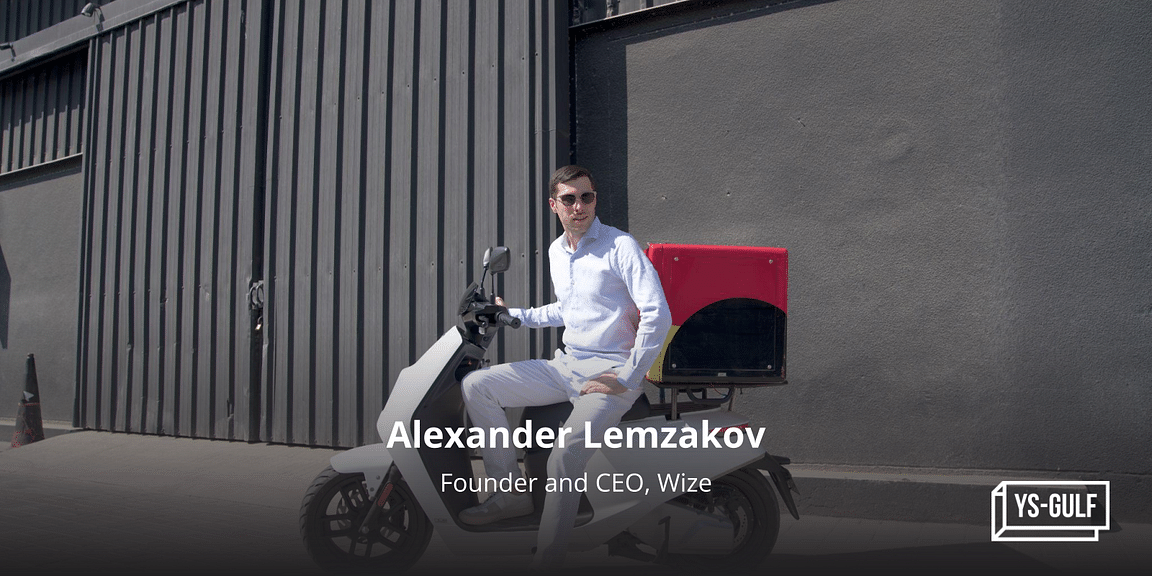The last-mile delivery and logistics industry in the UAE has grown significantly since 2020—driven by increasing online buying and the on-demand economy. However, despite the growth, the industry faces challenges with respect to lowering carbon emissions and fuel expenses in the last mile.
According to the World Economic Forum, the number of delivery vehicles in the 100 largest cities of the world will increase by 36% until 2030, and carbon emissions from delivery traffic will increase by 32%, adding 6 million tonnes of CO2.
Alexander Lemzakov, a growth strategist with a master’s degree in information technology, finance and investment, decided to address these hurdles by providing solutions that would electrify last-mile delivery. Thus was formed Wize in 2022—a B2B startup that offers eco-friendly last-mile delivery solutions.
“With the region’s unique combination of extreme weather conditions, the escalating climate crisis, and the rapid growth of the retail industry, we identified an untapped potential in electric motorcycles for delivery companies. The absence of such a solution in the region presented a clear opportunity to disrupt the delivery landscape for local businesses,” Lemzakov, Founder and CEO of Wize, tells YS Gulf.
“The last-mile delivery and logistics industry in the UAE and the Middle East is in need of change in terms of infrastructure improvement, technology adoption, workforce development, and regulatory support,” he adds.
Data-driven fleet management
Wize is a Dubai-based greentech startup that offers last-mile delivery solutions, including electric motorcycles (scooters and motorbikes), battery-as-a-service, swapping stations, fleet management software, and other software components to business owners.
Wize’s mobile app allows clients to rent or subscribe a vehicle, while its cloud-based SaaS platform provides a comprehensive, customisable dashboard that lets business owners remotely manage their fleets and inventory; plan, track and optimise delivery; collect data on driver behaviour; and monitor location, speed, and battery charge from onboard telematics.
Thus, Wize enables businesses to identify and address issues, optimise delivery routes, manage fleet utilisation, and gain customer insights, says Lemzakov.
Wize caters to industries such as e-commerce, retail, food delivery, and logistics. It works with small, mid-sized, and large enterprises and accommodates diverse delivery volumes and customer needs.
The startup currently operates in the UAE, with around 100 electric motorcycles currently deployed in Dubai. It plans to deploy around 200 motorcycles in Dubai in February and 1,000 by the end of 2024. It also plans to be fully operational in Saudi Arabia by this year.
“We have led to reduced costs for partners, as electric motorcycles are ideal for urban delivery and charging is made hassle-free through battery-as-a-service,” says Lemzakov.
For example, fuel costs can decrease significantly by 80% from $0.40 per mile to just $0.05 per mile. Maintenance expenses for EVs are also lower at $0.03 per mile compared to $0.1 per mile for conventional vehicles, he adds.
The company says businesses can achieve monthly cost savings of up to 30% by transitioning to Wize’s electric vehicles.
Wize does not manufacture motorcycles; it collaborates with manufacturers to rent out electric motorcycles.
Battery swapping
Wize Power has also installed battery swapping stations in Dubai to enable drivers to exchange batteries.
Wize’s Battery Swap App enables drivers to reserve batteries in advance, stay informed about their charge levels, and swap depleted ones for fully charged ones at swap stations.
The startup hopes to deliver 500 EV batteries next month and install 100 exchange stations over the next three years.
According to the company, the batteries are adapted to the weather conditions in the UAE, and the software also recognises battery status and technical characteristics, thus enabling recycling and a second life.
“We are focused on our own software component of the battery-as-a-service that allows it to manage battery swapping stations and monitor the condition of all batteries. Our software is fully compliant with local laws, and all data is located in the UAE,” Lemzakov explains.
White label solutions
The startup also offers white-label solutions, allowing logistics companies to rent out Wize’s fleet and battery infrastructure. Its turnkey platform integrates with logistics companies’ systems, providing customisation options for branding, mobile apps, API integration, reporting, and analytics.
This allows logistics companies to integrate their fleet management systems with Wize’s platform, allowing them to customise the platform’s branding and user interface.
“We allow them to access a centralised dashboard for fleet management, monitor vehicle performance, and track revenue. Customers can place orders, track deliveries, and manage accounts through a dedicated portal,” Lemzakov elaborates.
Looking ahead
According to Grand View Research, the global last-mile delivery market was valued at $132.71 billion in 2022 and is expected to grow at a compound annual growth rate (CAGR) of 8.8% from 2023 to 2030.
The last-mile delivery market in GCC, which was valued at $1106.22 million in 2020, is projected to reach $1,850 million in 2027, at a CAGR of 7.82%, according to Infinium.
Wize has secured $16 million in funding since 2022, including a pre-seed round led by MENA-focused angel investors, to enhance its presence in the UAE, develop its products, and explore partnership opportunities in the MENA region.
Going forward, Wize plans to expand its fleet and battery-swapping infrastructure; enter new markets in MENA and globally; partner with energy providers, technology companies and government agencies; and tailor solutions to local needs, such as preferred locations for swap stations and local guidelines.
Source: YourStory



![[CITYPNG.COM]White Google Play PlayStore Logo – 1500×1500](https://startupnews.fyi/wp-content/uploads/2025/08/CITYPNG.COMWhite-Google-Play-PlayStore-Logo-1500x1500-1-630x630.png)